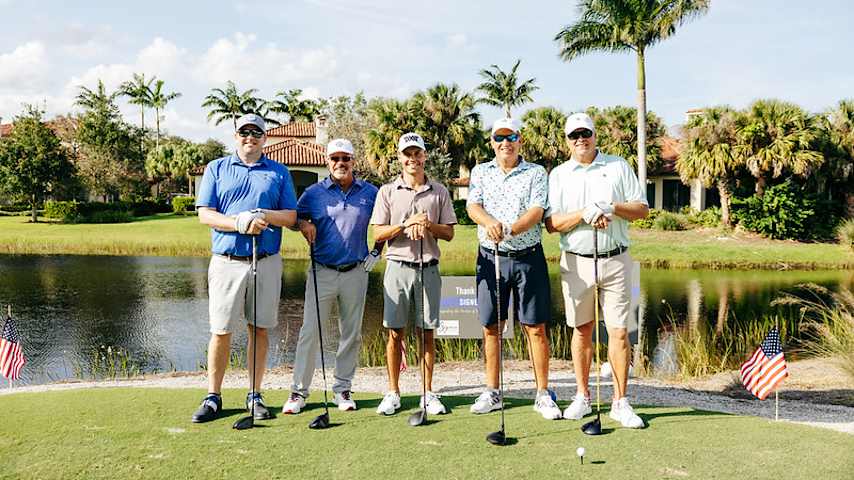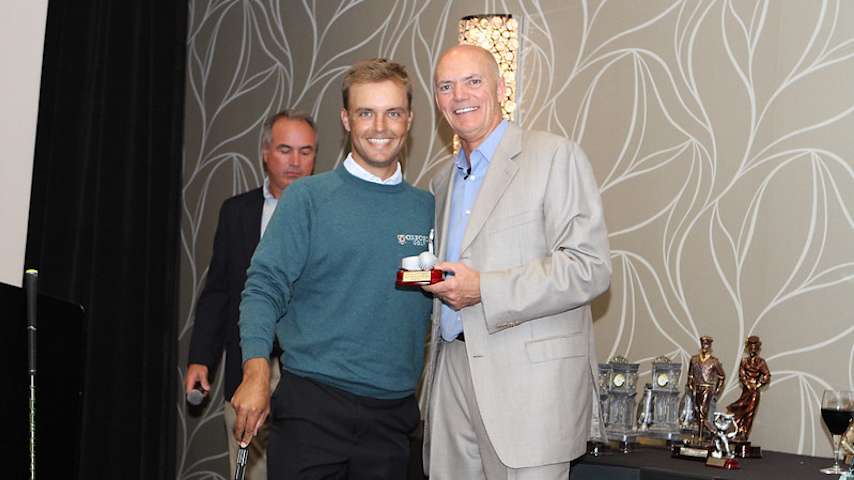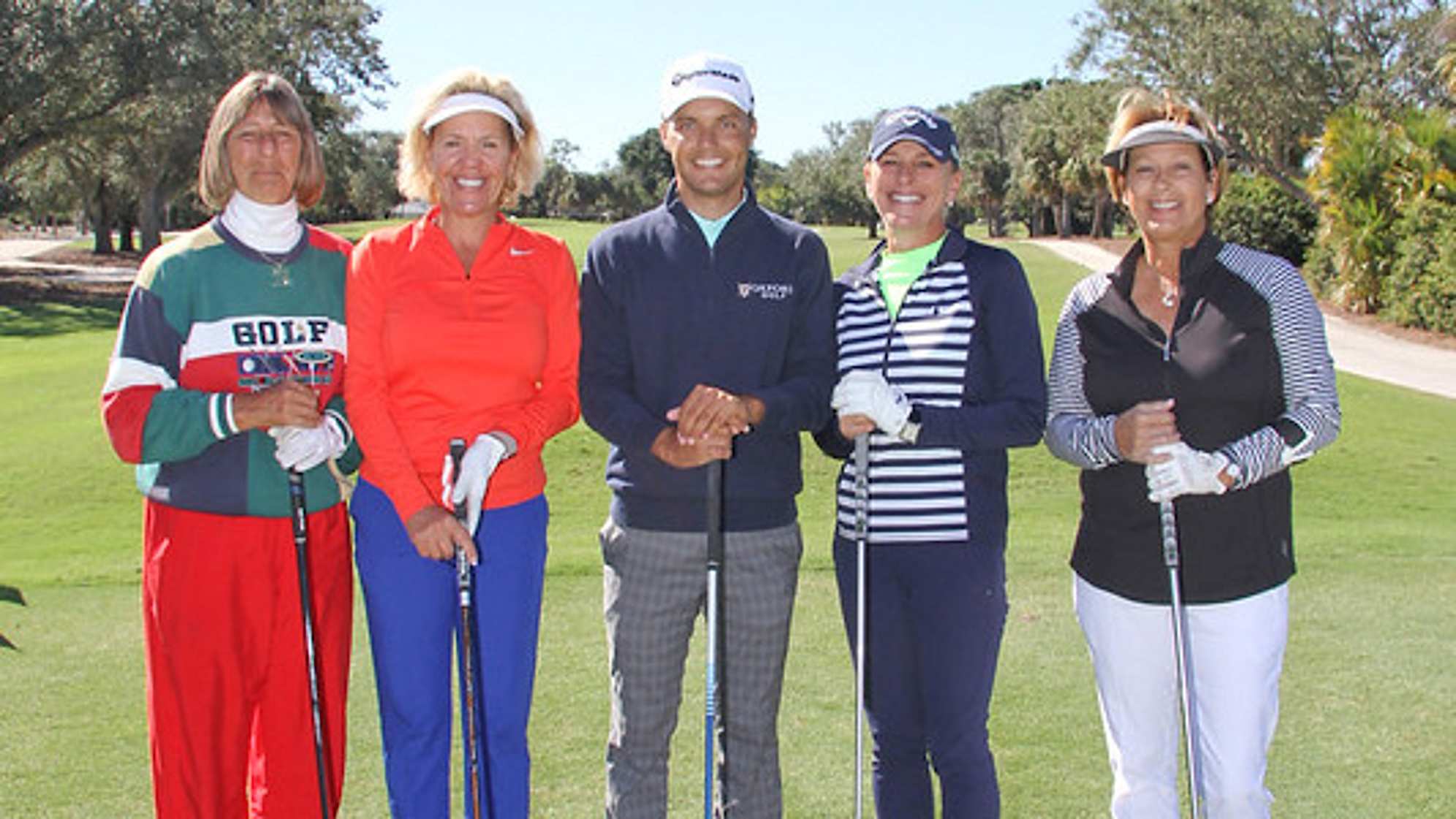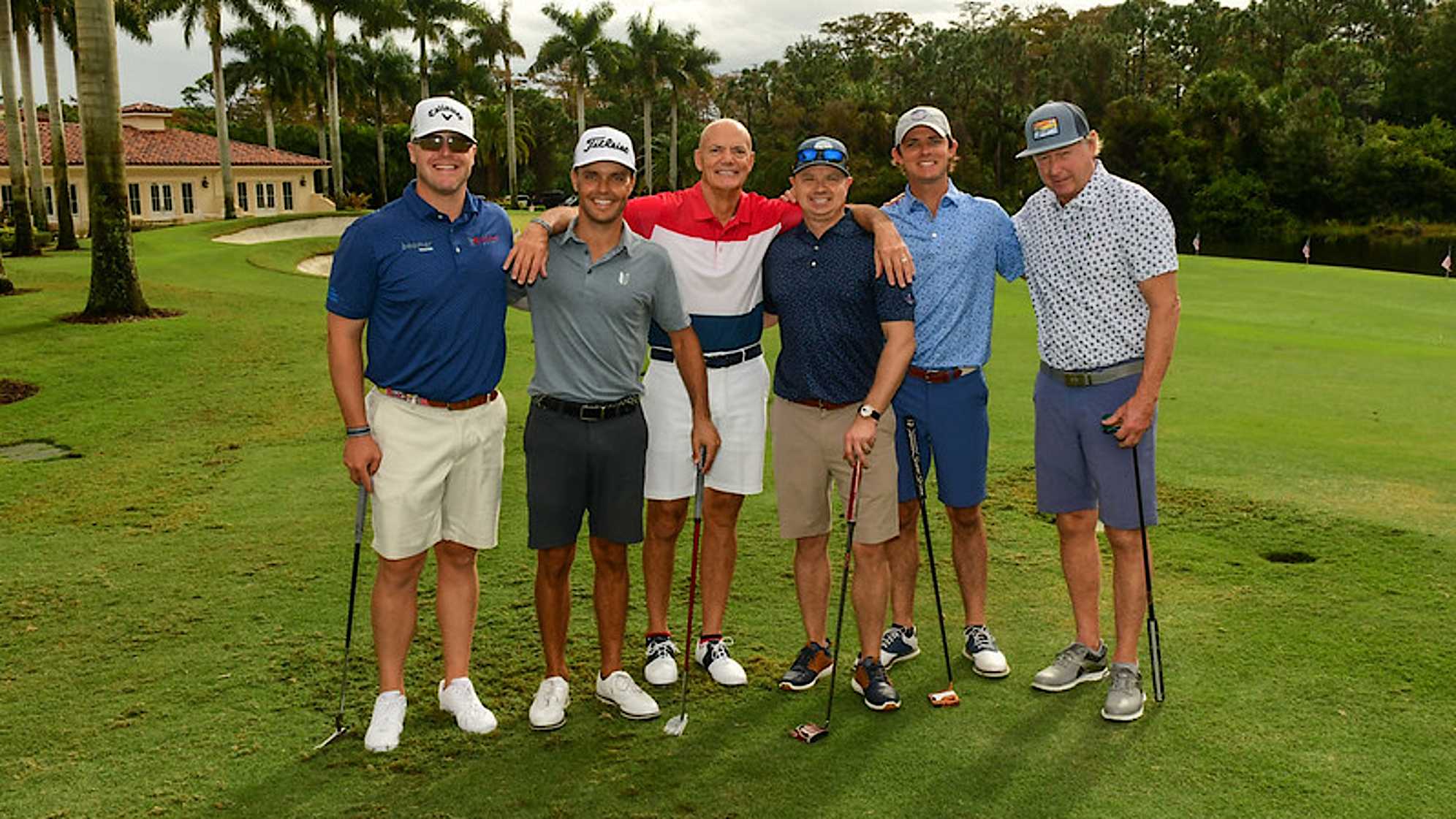How Eric Cole, RSM Birdies Fore Love support families of fallen first responders
7 Min Read

Eric Cole (middle) donated his $50,000 RSM Birdies Fore Love bonus to the McDavid Group Charities. (Credit McDavid Group Charities)
Escrito por Helen Ross
On those days when the phone is ringing off the hook and Tanya Barrett realizes she hasn’t gotten up from her desk in hours, she grounds herself by looking at the red-and-white dive flag in her office.
Her husband, Mark Barrett, was a member of the Virginia State Police Search and Recovery Team, whose emblem is embroidered on the flag. He drowned in a diving accident during a training session in a murky lake on Sept. 14, 2010. Their daughter was 15 when he died; their son was just 6.
“Every time I feel frustrated, or things aren't going my way, I always look up at that flag and just go, 'This is why you're here,'” Barrett says. “You're here to make sure nobody ever has to – even though they have to walk in your shoes or similar shoes – you can help ease that burden.
“You can help find ways to make this easier for them.”
Barrett is the executive director of The McDavid Group Charities, which supports the educational goals of and provides counseling for children and spouses of law enforcement officers and first responders who have died during the line of duty. The non-profit’s primary fund-raising event is the annual GOLF FOR COPS Pro-Am, which began in 2017.
Eric Cole has played in every one of those pro-ams. The 2023 PGA TOUR Rookie of the Year practices at Tequesta Country Club in the Jupiter area of South Florida and has gotten to know the event’s founder, Jim McDavid, and his wife, Maria, who are members there.

Eric Cole (left) poses with Jim McDavid, the founder of the annual GOLF FOR COPS Pro-Am. (Credit McDavid Group Charities)
So, when Cole earned one of the $50,000 RSM Birdies Fore Love bonuses during last year’s FedExCup Fall, he knew exactly what to do. He donated the entire amount to The McDavid Group Charities.
“It's just the type of organization and the cause that you want to be associated with,” Cole says. “It's also a lot of fun. I know a lot of people involved in it and when you hear the stories about how the families are impacted with their loss and when you hear that, you just want to do anything you can to help.
“Golf is a cool thing where we kind of have that opportunity to reach out and help certain causes and it's just one that seemed important to me … I always kind of had them in the back of my mind as far as helping them out. And when I was made aware that I was part of that RSM Birdies Fore Love, it just made a lot of sense, and it was kind of a no-brainer for me.”
Andy Bosman, the chief marketing officer with RSM US LLP, says stewardship and giving back are part of his company's culture. One way is through the unique RSM Birdies Fore Love program, which awards $50,000 to charity on behalf of the player who makes the most birdies at each of the eight FedExCup Fall events. The overall winner is awarded $300,000 for charity.
“Stewardship has been one of RSM’s core values since our firm was founded in 1926, and RSM Birdies Fore Love has been such an amazing way to continue that tradition of making a difference in our communities,” Bosman says. “We are thrilled to be able to support such deserving organizations like The McDavid Group Charities through RSM Birdies Fore Love.”
Jim McDavid decided he wanted to help the families of fallen first responders after hearing about five police officers who were killed during an ambush in Dallas in 2016. The GOLF FOR COPS Pro-Am has raised over $4.2 million since its inception.
“He started this just because of what pulled on his heartstrings,” says Barrett, who began working as a volunteer with the organization. “That's the kind of person he is … He's just such a humble and kind human being, and none of this would be possible without him.”
While some of the money has helped with counseling and camps for the children and retreats for spouses, college scholarships have become a focus in the last two years. The McDavid Group Charities has awarded five $40,000 grants – which are doled out in $10,000 increments per year.
Cole’s donation went directly to the scholarship fund. “So technically, (it) more than paid for one of our scholarship recipients and then a little bit extra for another,” says Barrett, who even goes so far as to post notices on a private Facebook group for surviving spouses to encourage their children to apply.
Barrett knows all too well the shock of that sudden loss and how it can alter a family’s plans. She remembers her husband’s very public funeral attended by policemen from all over the country, including one from California who brought her son a teddy bear and a card from former governor Arnold Schwarzenegger.
Eventually, the pain subsides and reality sets in. While some families have insurance and institutional or governmental support, it’s rarely enough to cover the loss of income from the spouse, much less college. And what about the teenagers applying to a university while they are still mourning the loss of their parent? Or a spouse who needs to go to school to learn new skills?
“I think in that moment or even that first year, you don't even realize the depth of the impact it has,” Barrett says. “You're just trying to get through every day at that point. But just the loss of knowing that the other person who shared every single thing about your kids is no longer there; that's the only other person on the planet, I feel like that cares as much as you do about your kids.”
When her husband died, he was teaching their daughter how to drive a car. She wouldn’t get her license for two more years – “She wouldn’t even get in the truck,” Barrett said. The milestones he missed are too many to mention.
“I think that's been the hardest impact, is just raising these kids without that guidance, without that other parent, really teaching them both how to drive, moving them both into college alone, just all those things,” Barrett says. “Their first dates, wondering what he would've done versus what I'm doing teaching my son how to tie a tie or to shave.
“And it's a joke – and it's absolutely not a joke – but my joke is that YouTube was his other parent because that was where we got so much of our information … I think those sorts of impacts like that, it's like a constant reminder of your loss.”
Barrett’s husband actually was a funeral director before he became a state trooper. He used to tell her that god knows the day a person comes into the world, as well as the day you will leave. She’s glad he died doing something he loved.
“The day before, he was like, (diving is) pure peace,” Barrett recalls. “So, I feel like I'm very thankful that it wasn't something like he wasn't run over by a drunk driver, and he wasn't shot and killed. I'm very thankful that I never had to go through feeling like a victim or feeling like he was a victim or going through a trial or anything. I've gone to trials with my friends. It's horrific.”
Barrett says her husband always said they’d move to Florida when they retired but she was having none of that. She didn’t want to leave her friends and family. When their son enrolled at the University of Virginia, though, Barrett decided the time was finally right.
“I ended up in Florida and it's so funny,” she says. “I love it every day, but I feel like I get little reminders from him every day that I'm doing exactly what I'm supposed to be doing and that it's all good in the world. And I get little signs, whether it's his badge number or I don't know, just something silly.”
What she found in the Sunshine State was a true labor of love.














